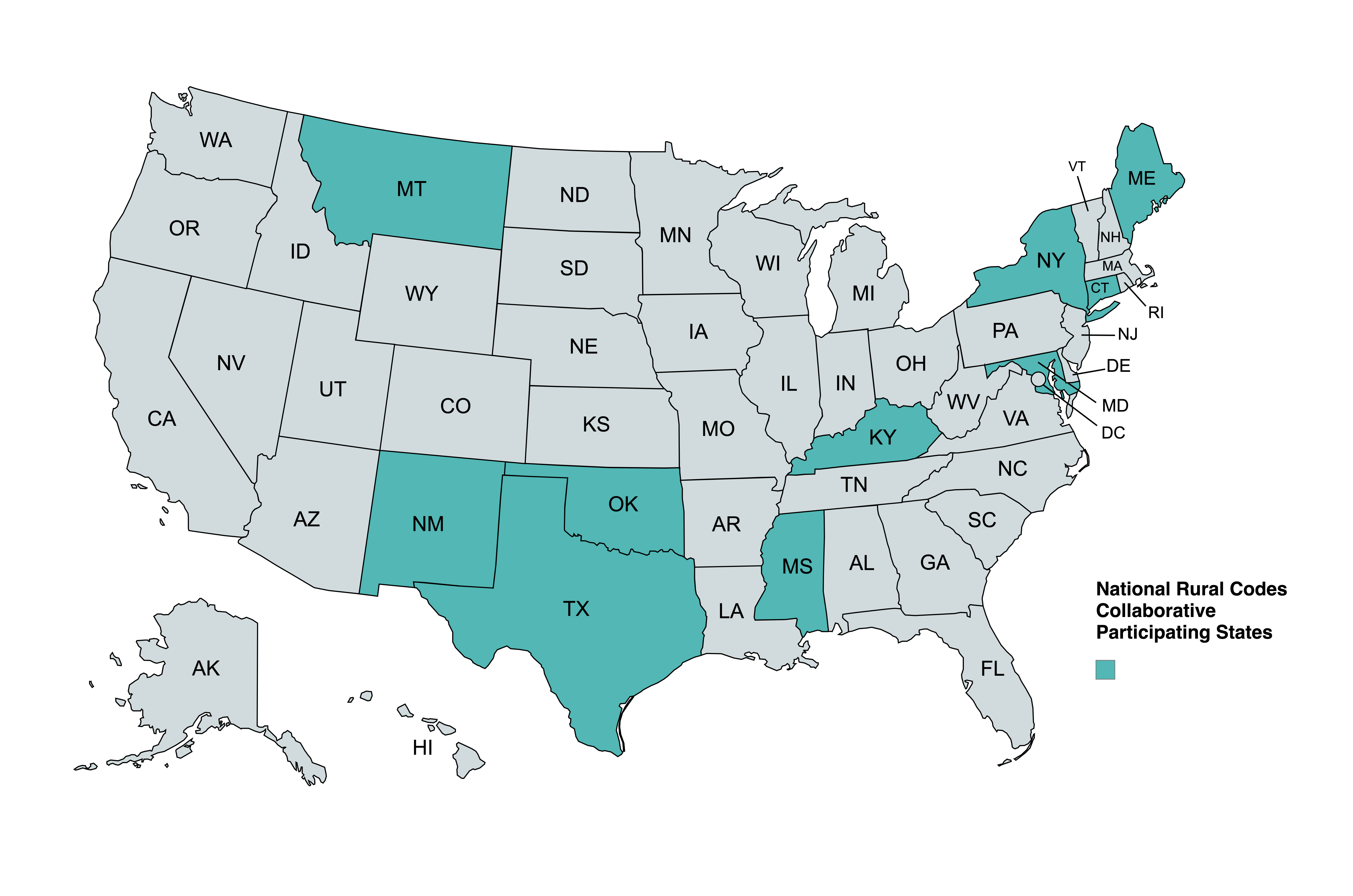

By Carly McGovern | Wed, September 3, 25
What is the National Rural Codes Collaborative?
The National Rural Codes Collaborative (NRCC) is a group of Regional Energy Efficiency Organizations (REEOs), states, tribal communities and others who are working together to overcome geographic, financial, and outreach barriers to implementing and enforcing building energy codes and energy efficiency programs in rural areas. Participating states include Connecticut, Kentucky, Maine, Maryland, Mississippi, Montana, New Mexico, New York, Oklahoma, and Texas.
Why Rural Energy Codes?
Energy codes set minimum energy efficiency standards for new and renovated buildings. Energy codes aren’t just technical standards, they are tools for lowering utility bills, improving indoor comfort, and making homes more resilient. Nationally, rural areas do not benefit from energy codes to the same extent as their metropolitan counterparts and rural residents on average face a 42 percent higher energy burden (defined as the percentage of household income spent on housing energy costs, including electricity, gas, and other fuels) than their urban counterparts (ACEEE). Rural communities are a priority for addressing energy burden, as they often face higher rates of poverty (USDA).
When codes are not updated or effectively enforced in rural communities and Tribal Nations, their residents are left with homes and buildings that have higher energy bills, higher pollution, and that pose potentially negative impacts on comfort, health, and safety. The NRCC aims to improve building energy code implementation in rural communities, resulting in long-term improvements in energy affordability and resilience for rural households.
Current Work of the NRCC
We’re in Phase One of a three-phase project:
So far, we have:
- Completed the Rural Barriers Research Plan for all 10 states and Tribal Nations
- Hosted our first Project Advisory Committee (PAC) and Technical Advisory Group (TAG) meetings
- Held webinars in all ten participating states
- Connected with over 100 rural stakeholders
Our PAC and TAG meetings serve as a space for idea sharing among rural communities, allowing them to identify similar challenges and discuss unique state-specific issues. This feedback ultimately steers our project to better serve the states and communities we are working with. Our conversations with code officials reveal that this project can also be used to support a profession that is often overlooked.
Following the first PAC and TAG meetings, NEEP hosted webinars for the four participating NEEP states and attended and offered support at state webinars hosted by the other REEOs. Before the webinars, partners worked with NEEP to craft research goals and chose a focus around adoption, compliance, and enforcement that best fit their states’ needs, as shown in Table 1.
| CT | KY | ME | MD | MS | MT | NY | NM | OK | TX | Tribal Communities | |
|---|---|---|---|---|---|---|---|---|---|---|---|
| Adoption | X | X | X | X | X | ||||||
| Compliance | X | X | X | X | X | ||||||
| Enforcement | X | X | X* | X | X | X | X | X | X | X | X |
Adoption refers to the process of updating codes to reflect more advanced energy efficiency requirements, usually following updates to the International Energy Conservation Code, which is updated approximately every three years. Compliance means following these requirements in new building and renovation projects. Enforcement encompasses the process of carrying out the energy code, from permit review to inspection.
Regardless of their differences, most research goals fall into three common themes:
- Gaps and challenges in energy code implementation in rural communities
- Code enforcement and construction workforce capacity in rural communities
- Goals and priorities of rural communities and how these align with energy code implementation
The webinars provided a critical opportunity to convene states independently and learn about their unique needs. In the meetings, we guided conversations to advance our project and support states in addressing the research goals. After the webinars, the REEOs got to work, using their takeaways to craft surveys that addressed both the topics of conversation that were important to rural stakeholders, and the goals set by our project partners.
Lessons Learned
In our conversations with rural stakeholders, one theme stands out: code officials wear many hats and are overextended. They seek more training, resources, and community understanding of their work. That’s where the NRCC is stepping in. Energy code enforcers (including positions such as building officials, code enforcement officers, and energy raters) need support and engagement from the whole building workforce. Contractors, building owners, and design professionals need to know when and how to engage energy code enforcement when they have questions, or when required to comply with building codes for new construction and renovations. Code enforcement requires coordination across professions. In rural areas facing workforce shortages, geographic hurdles, and financial barriers, it is a process that needs to be streamlined.
Our biggest takeaway so far: The National Rural Codes Collaborative represents a national interest in addressing the energy code gap in rural communities, and need for this kind of research. We are learning and improving the project as we go but remain guided by our goal of listening to and supporting rural communities.
What's Next
The next step in Phase One will be surveys for rural stakeholders in each participating state. These surveys are intended to:
- Address the research goals and questions set by project partners
- Reflect the priorities of the rural stakeholders of each state and Tribal Nations
- Advance the understanding of barriers to energy code implementation in rural communities in the member states, and providedata to compare across states.
- Collect data that will shape actionable strategies for pilot programs
These surveys will be available for rural stakeholders and community members from participating states to take. Surveys will be posted on the NEEP website in the coming weeks!
For more information on the NRCC, visit the NRCC Resource Center.


